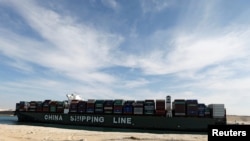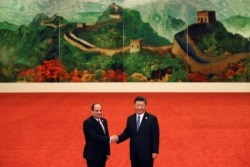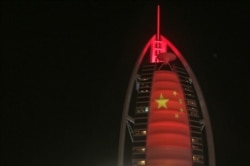China is emphasizing trade cooperation with the Middle East and North Africa during the COVID-19 pandemic, but some observers think many recent initiatives have been more for show than substance.
Egyptian media extensively reported on a recent shipment of health care and medical equipment from China, suggesting improving economic ties between the two countries remains a focus of the Egyptian government.
Egyptian President Abdel Fattah el-Sisi has made five trips to China since taking office in 2014, and Beijing was Egypt's second largest economic partner in 2019 with $10 billion in trade.
Sisi told a global gathering in Beijing last year that he was anxious to visit China due to the importance Egypt gives to the Belt and Road initiative, in addition to the joint interests and mutual threats that bind the two countries together.
A large part of China's trade with North Africa and Europe transits through the Egyptian-controlled Suez Canal. China agreed to invest $18 billion in Egypt in 2018, including a joint trade zone along the canal, in addition to infrastructure projects in the energy, transport and building sectors.
Dr. Paul Sullivan, a professor at the U.S. National Defense University, told VOA that "China is not as dominant in trade with the region as many may think, but they sure would like to be, (and) their importance in trade with these countries has grown quite a bit since 2000."
"China is Egypt and Lebanon's largest source of imports, but most regional countries have a well-diversified source of imports and markets for exports, depending on what they are exporting, such as oil and gas, and what they are importing, such as transport vehicles, telecommunications equipment, etc.," Sullivan said.
China's relations with the United Arab Emirates has also expanded dramatically in recent years, with Beijing becoming the UAE's largest trading partner in 2017 with $53 billion in trade. Projections of $80 billion in trade in 2020 will probably not materialize, due to the COVID-19 pandemic's damper on world trade.
The Port of Dubai is a key focal point of Chinese trade throughout the region.
China has also stepped up health and medical aid to Iran in the wake of the COVID-19 crisis, which has hit Tehran hard. Nevertheless, trade relations between China and Iran are fairly insignificant compared to those with the UAE and Saudi Arabia.
Similarly, agreements between China and Syria to help rebuild that country's war-damaged infrastructure have gained media attention but remain relatively insignificant in numerical terms. Chinese electrical, engineering and construction firms have participated in recent Damascus trade fairs.
Algeria has also been a major focus of Chinese trade in the Arab world, with Algiers importing close to $8 billion in goods and services from Beijing in 2018.
Chinese Ambassador Yang Ghuangho said China and Algeria decided to build a new shipping port in the Algerian city of Cherchell, and that the port's future capacity will be from 3 to 6 million freight containers per year, compared to the current 800,000 containers.
China's Middle East trade representative, Zuhai Jon, insisted during a recent visit to Morocco that trade between the two countries had seen a large uptick, including Chinese imports of minerals and nearly 200,000 Chinese tourists visiting the country.
Niu Xinchun, director of China's Institute of Middle Eastern Studies, told a recent Chatham House research group that "China is a relative newcomer to the Middle East" and international media exaggerates its role in the region.
"U.S. media," he said, "overstated China's capability and intentions."
Nevertheless, increasing bilateral trade between China and most Middle East countries is evident, despite temporary setbacks due to COVID-19.















